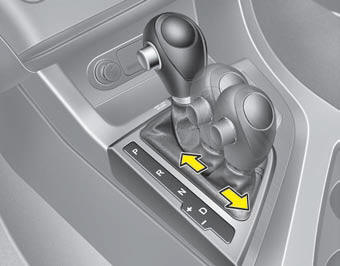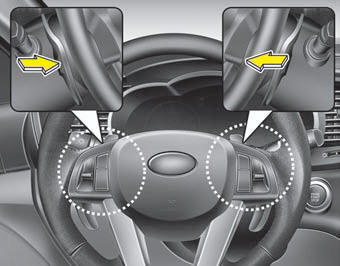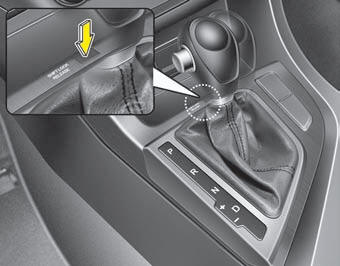 Kia Optima: Automatic transaxle operation
Kia Optima: Automatic transaxle operation
The automatic transaxle has 6 forward speeds and one reverse speed. The individual speeds are selected automatically, depending on the position of the shift lever.
✽ NOTICE
The first few shifts on a new vehicle, if the battery has been disconnected, may be somewhat abrupt. This is a normal condition, and the shifting sequence will adjust after shifts are cycled a few times by the TCM (Transaxle Control Module) or PCM (Powertrain Control Module).
For smooth operation, depress the brake pedal when shifting from N (Neutral) to a forward or reverse gear.
![]() WARNING - Automatic transaxle
WARNING - Automatic transaxle
- Always check the surrounding areas near your vehicle for people, especially children, before shifting a shift lever into D (Drive) or R (Reverse).
- Before leaving the driverŌĆÖs seat, always make sure the shift lever is in the P (Park) position; then set the parking brake fully and shut the engine off. Unexpected and sudden vehicle movement can occur if these precautions are not followed in the order identified.
![]() CAUTION
CAUTION
- To avoid damage to your transaxle, do not accelerate the engine in R (Reverse) or any forward gear position with the brakes on.
- When stopped on an upgrade, do not hold the vehicle with engine power. Use the service brake or the parking brake.
- Do not shift from N (Neutral) or P (Park) into D (Drive), or R (Reverse) when the engine is above idle speed.
Transaxle ranges
The indicator light in the instrument cluster displays the shift lever position when the ignition switch is in the ON position.
P (Park)
Always come to a complete stop before shifting into P (Park). This position locks the transaxle and prevents the front wheels from rotating.
![]() WARNING
WARNING
- Shifting into P (Park) while the vehicle is in motion will cause the drive wheels to lock which will cause you to lose control of the vehicle.
- Do not use the P (Park) position in place of the parking brake. Always make sure the shift lever is latched in the P (Park) position and set the parking brake fully.
- Never leave a child unattended in a vehicle.
![]() CAUTION
CAUTION
The transaxle may be damaged if you shift into P (Park) while the vehicle is in motion.
R (Reverse)
Use this position to drive the vehicle backward.
![]() CAUTION
CAUTION
Always come to a complete stop before shifting into or out of R (Reverse); you may damage the transaxle if you shift into R (Reverse) while the vehicle is in motion, except when ŌĆ£Rocking the VehicleŌĆØ explained in this section.
N (Neutral)
The wheels and transaxle are not engaged. The vehicle will roll freely even on the slightest incline unless the parking brake or service brakes are applied.
D (Drive)
This is the normal forward driving position. The transaxle will automatically shift through a 6-gear sequence, providing the best fuel economy and power.
For extra power when passing another vehicle or climbing grades, depress the accelerator fully, at which time the transaxle will automatically downshift to the next lower gear.
✽ NOTICE
Always come to a complete stop before shifting into D.

Sports mode
Whether the vehicle is stopped or in motion, sports mode is selected by pushing the shift lever from the D (Drive) position into the manual gate. To return to D (Drive) range operation, push the shift lever back into the main gate.
In sports mode, moving the shift lever backwards and forwards will allow you to make gearshifts rapidly. In contrast to a manual transaxle, the sports mode allows gearshifts with the accelerator pedal depressed.
Up (+) : Push the lever forward once to shift up one gear.
Down (-) : Pull the lever backwards once to shift down one gear.
✽ NOTICE
- In sports mode, the driver must execute upshifts in accordance with road conditions, taking care to keep the engine speed below the red zone.
- In sports mode, only the 6 forward gears can be selected. To reverse or park the vehicle, move the shift lever to the R (Reverse) or P (Park) position as required.
- In sports mode, downshifts are made automatically when the vehicle slows down. When the vehicle stops, 1st gear is automatically selected.
- In sports mode, when the engine rpm approaches the red zone shift points are varied to upshift automatically.
- To maintain the required levels of vehicle performance and safety, the system may not execute certain gearshifts when the shift lever is operated.
- When driving on a slippery road, push the shift lever forward into the +(up) position. This causes the transaxle to shift into the 2nd (or third) gear which is better for smooth driving on a slippery road. Push the shift lever to the -(down) side to shift back to the 1st gear.

Paddle shifter
The paddle shifter is available when the shift lever is in the D position or the sport mode.
With the shift lever in the D position
The paddle shifter can operate when the vehicle speed is more than 10km/h.
Pull the [+] or [-] paddle shifter once to shift up or down one gear and the system changes from automatic mode to manual mode.
If the vehicle speed is lower than 10km/h, if you depress the accelerator pedal for more than 7 seconds or if you shift the shift lever from D to sport mode and shift it from sport mode to D again, the system will change from manual mode to automatic mode.
With the shift lever in the sport mode
Pull the [+] or [-] paddle shifter once to shift up or down one gear.
✽ NOTICE
If you pull the [+] and [-] paddle shifters at the same time, you can't shift the gear.
Shift lock system
For your safety, the automatic transaxle has a shift lock system which prevents shifting the transaxle out of P (Park) unless the brake pedal is depressed.
To shift the transaxle from P (Park) into R (Reverse):
1. Depress and hold the brake pedal.
2. Start the engine or turn the ignition
switch to the ON position.
3. Move the shift lever.
If the brake pedal is repeatedly depressed and released with the shift lever in the P (Park) position, a chattering noise near the shift lever may be heard. This is a normal condition.
![]() WARNING
WARNING
Always fully depress the brake pedal before and while shifting out of the P (Park) position into another position to avoid inadvertent motion of the vehicle which could injure persons in or around the vehicle.

Shift-lock override
If the shift lever cannot be moved from the P (Park) into R (Reverse) position with the brake pedal depressed, continue depressing the brake, then do the following:
1. Carefully remove the cap covering the shift-lock access hole.
2. Insert
a key (or screwdriver) into the access hole and press down on the key (or screwdriver).
3. Move the shift lever.
4. Have your vehicle inspected by an authorized Kia dealer
immediately.
Ignition key interlock system
The ignition key cannot be removed unless the shift lever is in the P (Park) position.
 Automatic transaxle
Automatic transaxle
Depress the brake pedal
and the lock release button when shifting.
Press the button when
shifting.
The shift lever can
be shifted freely. ...
 Good driving practices
Good driving practices
Never move the shift lever from P (Park) or N (Neutral) to any other position
with the accelerator pedal depressed.
Never move the shift lever into P (Park) when the vehicle is in motion.
Be ...
See also:
Air cleaner
Filter replacement
It must be replaced when necessary, and
should not be washed.
You can clean the filter when inspecting
the air cleaner element.
Clean the filter by using compressed air. ...
Description
The Electronic Throttle Control (ETC) System consists of
a throttle body with an integrated control motor and throttle position sensor
(TPS). Instead of the traditional throttle cable, an Accele ...
Mode selection
The mode selection button controls the direction of the air flow through the
ventilation system.
Every time you press the mode selection button, the mode will change as follows:
Refer to the i ...
